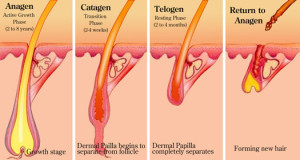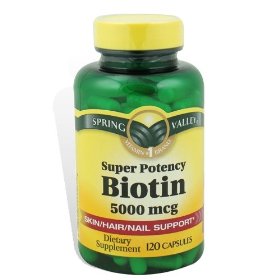The Hair Growth Cycle has three main phases: Anagen (growth) phase, Telogen (rest) phase, Catagen (degeneration) phase. Recently there has been an additional process described, called Kenogen. Human hair growth cycle is unlike the animal hair growth cycle as each invidual hair cycles independently of those beside it. However, at any point in time, 90% of hairs are found to be in anagen, roughly 10% in telogen and a miniscule amount in catagen.

Anagen
Anagen is also called the “growing phase”. It is a genetically predetermined time period when the follicle is active. This time period can last from 2-6 years. Each area of the body has a predetermined anagen phase. This is why your chest hairs don’t normally grow as long as those on your head.
Catagen
This is a degenerative process where the dermal papilla (that part of the hair follicle responsible for producing the proteins which will form the hair shaft), will start to degenerate and be destroyed. Typically, hair growth stops and the hair follicle is broken down as the hair shaft detaches from the dermal papilla stem cells. It is typically referred to as the “dying phase” in the hair growth cycle. It usually lasts for a few weeks.
Telogen
This is where the hair then goes into a suspended “resting phase” and the club hair is formed. It usually lasts about 3 months. This hair will be gradually pushed out once the new hair in anagen will grow and force it out. Telogen hairs are easily removed from the scalp. This is why when you comb your hair you will remove some. Even more are removed when you wash your hair simply because of the greater amount of manipulation of the hair during the shampoo process. A normal amount that is shed is 50-150 hairs a day. Naturally shed hairs have a white bulb on them (typical club hair).
The Hair Doc
Dr. Llorenia Muir-Green is a practising dermatologist in Jamaica. She has an avid interest in hair and scalp disorders. She is a member of the Medical Association of Jamaica, Dermatology Association of Jamaica and is an Associate Member of the Caribbean Dermatology Association. She was a recipient of the 2013 Fellowship in Hair and Scalp Disorders at the University of British Columbia.


